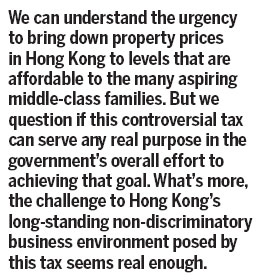New property tax sets a bad precedent
Updated: 2013-01-04 06:36
By Hong Liang(HK Edition)
|
|||||||

The surge in property prices in the past couple of years was certainly worrisome. It was widely considered as a major source of rising discontent among middle-class families who can no longer afford the dream of owning their own homes.
For that reason, the latest government measures that include clamping down on excessive speculation and an initiative to build more affordable housing have received wide public support. But the government may have taken an essentially pointless and needlessly controversial step in the introduction of a new tax on the purchase of residential apartments by non-residents and corporations.
The tax, at 15 percent of the purchase price, reportedly has significantly depressed demand for high-end properties. Luxury home sales reportedly dropped nearly 20 percent since the introduction of the tax and analysts said developers would need more time to sell. A developer was quoted as saying the tax has "interrupted" the sales plan of the 20 luxury apartments with a combined market price of about HK$2.5 billion. Because of the new tax, the developer said he has to delay the sales of those apartments till sometime next year.
The effect of the tax is being felt mainly at the luxury end of the market. This is not going to do any good to the many prospective home buyers who won't afford those apartments even at reduced prices. What's more, developers have at their disposal sufficient resources to hold those apartments for rental rather than selling them at prices that do not yield a reasonable return.
Meanwhile, developers are up in arms over the tax because it inhibits them from acquiring apartments in old city blocks for redevelopment. In a recent meeting with government housing officials, developers threatened to pull out of future city renewal projects, claiming that the tax has rendered those projects unprofitable by adding to the cost of acquiring old apartments for redevelopment.
While the computation seems straightforward enough, we aren't so sure if the threat was real. We all know that the supply of properties in the city's choice locations is severely limited. There is no shortage of potential buyers who are willing to pay the tax-inflated price for the investment value of those properties.
Accusing government officials of acting out of ignorance, the chairman of the powerful Real Estate Developers Association Stewart Leung was quoted as saying that no developers would be interested in further redevelopment. Let the government do it by itself, he said.
Whoever undertakes the work, it doesn't really matter to the majority of potential homebuyers because the apartments in the inner city areas are mostly beyond their reach. If the tax succeeds only in dampening demand for high-end properties, it serves no real purpose.
There are those who object to the tax on ideological grounds saying the discriminatory nature of the tax could set a dangerous precedent that could damage Hong Kong's status as an international business center. To preserve that status, the government has always stated the cardinal rule for ensuring a level playing field for all parties doing business in Hong Kong: All the laws, regulations and taxes are applied indiscriminately to all businesses and investors, local or foreign. The new tax stands out as an exception, critics said.
We can understand the urgency to bring down property prices in Hong Kong to levels that are affordable to the many aspiring middle-class families. But we question if this controversial tax can serve any real purpose in the government's overall effort to achieving that goal.
What's more, the challenge to Hong Kong's long-standing non-discriminatory business environment posed by this tax seems real enough. The Hong Kong economy is too externally oriented to entertain such a controversial tax. Let's not forget, the inflow of hot money seeking a safe haven during the turbulent times of the 1960s sow the seed of the financial center we have now.
The author is a current affairs commentator.
(HK Edition 01/04/2013 page3)